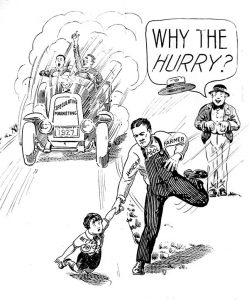(June 28, 2018) Few things are more predicable than the creatures of the Government of Alberta making grand plans to take grain trade regulation away from the public interest and give it to the corporate sector.
This all stems from the long-standing Alberta government policy of doing everything it can to provide cheap grain for cattle feeding and other grain processors in Alberta. In a meeting I had with Walter Paszkowski, then Alberta’s Progressive Conservative Agriculture Minister, he embarrassed his handlers and startled my two companions by telling us the Wheat Board was an impediment to this policy. Some years later in a meeting with Oneil Carlier, Alberta’s current Agriculture Minister, Carlier refused to engage in a discussion about how Alberta’s Agricultural check-off groups allocated their funding to this end. Later Carlier effectively reversed a policy allowing Alberta producers to ask for their money back from the check-off commissions – demonstrating the old adage that “no matter who you voted for, the government got in.”
One of the Alberta government’s most reliable creatures is the Alberta Wheat Commission. Like the other Alberta agricultural check-off commissions, it holds the counterfeit of democratic elections to select its Board of Directors. Not surprisingly those elections regularly produce a group of people who talk about free enterprise in agriculture while ignoring the reality of the global market place and the fact, to pick just one of many examples, that only two companies, Cargill and JBS, control about 90% of beef packing in Canada. Sometimes they even do it with a straight face!
The AWC’s June newsletter is a vintage example of thinking “inside the box.” Their message is that the Canadian Grain Commission is “a legislative relic.” In the AWC’s bubble the legislative mandate of the Grain Commission to “work in the interests of farmers” apparently has no importance to either farmers or customers. Nor does the fact farmers have off-set the great cost of getting their grain to tide water (in some of the world’s worst weather through six mountain rangers) by selling quality-assured grain to quality conscious premium markets like Japan.
Instead, in the same issue AWC suggests Columbia, a small and only semi-stable Latin American country is eager to buy lower quality wheat – the implication being prairie farmers can forget about quality assurance standards and sell to the Columbias of this world. It has apparently never crossed the serene minds at AWC that farmers make less if they grow low quality wheat for poor markets.
Their June newsletter also makes the laughable suggestion that inspections by private contractors can replace the objective quality assurance provided by the Canadian Grain Commissions’ grain inspections. The CGC has a sterling international reputation for honesty and objectivity. That’s why our customers trust their inspections.
Apparently to the AWC what our customers want, and the credibility of our grading and export system does not matter. Perhaps AWC has already forgotten Japan imposed a ban on prairie wheat last week because of genetically modified wheat plants found in Southern Alberta.
The AWC does not seem to recall that since the Harper administration killed the Canadian Wheat Board in 2011, international customers have consistently made complaints that our quality standards are slipping. So aside from the deep thinkers at the Alberta Wheat Commission, who exactly is asking us to lower our inspection standards and harmonize our grading system with the US? Certainly not our customers.
Reading the AWC’s publications makes it clear they are reliability promoting an economically illiterate Alberta Government policy from the 1970s to “walk all the grain off the prairies.” That isn’t in the best interests of prairie farmers no matter what the AWC claims. Our customers want high quality standards and we should listen to them.



When one sells junk, no inspection is required, money saved. The affect on the consumer is irrelevant to the seller.
It is well known that in capitalism, ‘money saved is money earned.’ It is never passed on to the worker/farmer. That is why regulations were made to protect people. Removing the protections invite the ‘Barbarians At The Gate’ in.
Having no power is well known but the attitude that ‘I can’t do anything about it’ has to change. Its true that one person can’t, but working with others, you can change anything you want.